MARKET OVERVIEW
The North America Halal Food and Beverage market has attracted increasing attention with regards to the swelling demand for such kinds of foods which meet the dietary principles of the Muslims in the region. This is a broad category of food and beverage products which come under the gambit of Islamic dietary laws, whose ingredients, processing, packaging, and distribution are subjected to the most critical standards of halal certification. With growing numbers and a highly diversified Muslim population in North America, the demand for halal food and beverages will continue to rise in order to meet not just the needs of Muslims but also consumers who perceive halal products as healthier or more ethical.
The North American halal food and beverage market has emerged through the interaction of many different cultures and consumer needs. Having Muslims in the region from varied ethnic backgrounds, there is a high probability that the market will come up with various types of halal-certified products, which would relate to diverse cuisines. The North America Halal Food and Beverage market would continue to be everything from distinctively Middle Eastern and South Asian cuisines to mainstream items that fundamentally mirror the cultural tapestry of Muslims in the region.
This is further propelled by the increasing awareness and interest of non-Muslims in the products of halal. A large number of people have been drawn to consuming halal foods due to the perception that such food is prepared in consonance with their values on ethical treatment of animals and higher standards. It is with such awareness that the market in North America Halal Food and Beverage would likely create a wider scope of consumers beyond its conventional Muslim customers. This would further open up avenues for an increase in the availability and proliferation of more types of food products made available by food producers and retailers that are halal.
Certification acts as a key driver in the North America Halal Food and Beverage market in terms of product authenticity and consumer trust. Halal certification ensures a regular inspection and control process in conformity with Islamic dietary laws right from the very sourcing of raw material to the final packaging of the products. The market can only grow if a proper need for valid and well-known certification bodies arises. Companies that want to be part of this market will struggle very hard to maintain such a high bar, as customers increasingly require more transparency and assurance in the halal status of their purchases.
Besides, the North America Halal Food and Beverage market is in such a position to experience technological advances, which in turn will further develop products and consumer access. This is supposed to get even more innovative, from making halal products more accessible via online platforms, to the value addition in food processing that guarantees the integrity of halal products, as a way of responding to changing customer needs. E-commerce, especially, is set to become one of the main channels that will widen access to halal products for more consumers in North America.
In this way, the North America Halal Food and Beverage market is inclined to follow the path of growth enhancement. Due to the increased demand for halal products from both Muslim and non-Muslim consumers, the variety and availability of halal-certified products within the industry will continue to grow. The future of this market is thus bound to be dynamic and inclusive, with continuing emphasis on certification, cultural diversity, and technology advancement to meet a wide range of consumer preferences without sacrificing integrity in halal principles.
North America Halal Food and Beverage market is estimated to reach $84447.5 Million by 2031; growing at a CAGR of 10.5% from 2024 to 2031.
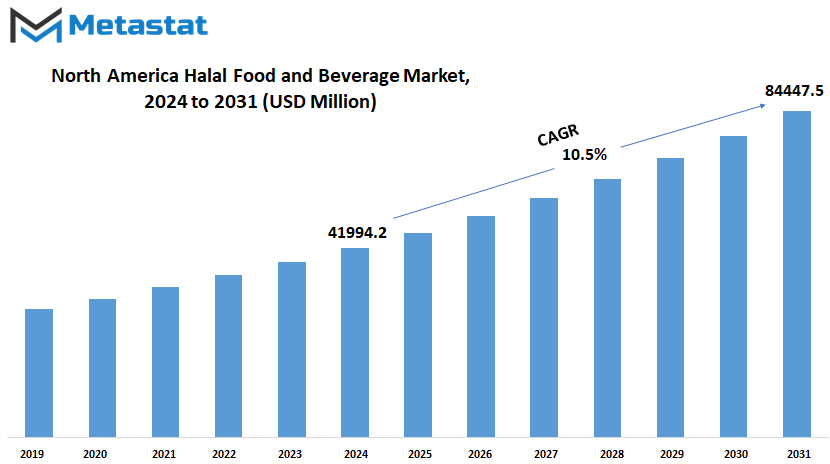
GROWTH FACTORS
The North America Halal Food and Beverage market is showing steady growth. This growth has been attributed to various key causes or factors that bring the industry to its heights. Firstly, there is the rise in awareness amongst both Muslim and non-Muslim consumers related to the consumption of more Halal accredited products. With increased consciousness regarding the advantages attached to such Halal food, such as cleanliness and hygiene, ethics, and good quality ingredient usage, the market keeps growing. In addition, the swelling population of Muslims in North America, plus the increase in disposable incomes, fuels this demand. More consumers now prefer ethical and healthy foods, and Halal products meet these criteria; hence, a wide circle of consumers are attracted towards these products.
The market also continues to benefit from an increasing availability of Halal-certified products. Retailers and food manufacturers alike are thus responding by stocking more types of Halal products, which in turn makes them more accessible to consumers. This better availability is further being fueled by the work of various certification bodies whose work it is to ensure that products are indeed Halal by meeting specific standards that ensure consumers have confidence in what they purchase.
However, there are still some obstacles that hamper its development. First of all, the lack of a single standardized process of Halal certification in North America is believed to be one of the main barriers that can cause confusion among both consumers and producers, which holds back the market from developing to its full capacity. In addition, the relatively higher expense to gain Halal certification could be a discouraging factor for small and medium-sized enterprises due to limited market access.
Despite these challenges, the North America Halal Food and Beverage market presents immense opportunities for growth in the coming years. For instance, food production is more technologically and innovatively produced, which could become a game-changer. More plant-based and alternative proteins with higher standards of Halal might thus allow new avenues to emerge. With these products now available in their Halal versions, the companies offering these products are well-placed to capture larger shares of the market as consumer preference lists gradually shift toward healthier and more sustainable options.
Globalization of the food trade adds to the potential of North American companies exporting Halal products to other regions, such as the Middle East and Southeast Asia, where demand is high. The result is the possibility of more diversified markets that North American Halal food producers could extend their reach into and spur further growth.
In conclusion, despite existing challenges, the market of North America Halal Food and Beverage will keep expanding due to increase in demand, availability, and developing global market opportunities.
MARKET SEGMENTATION
By Product Type
This is coupled with the cultural shift, increasing awareness, and consumer demand for ethical and religiously compliant products that have driven the growth in the North American market for Halal Food and Beverage. With the increasing population of Muslims in the region, the demand for halal-certified food and beverages keeps increasing. The products belonging to this market are as varied as can be imagined, categorized by type: Halal Meat & Alternatives, Halal Milk & Milk Products, Halal Grains, Fruits & Vegetables, and other halal-certified products. Growing variety in the types of products in these segments speaks well for the dynamism of this market.
Halal Meat & Alternatives form a sizeable part of the market segment. Historically, there has been a high demand for halal meats among Muslims; it would appear that is changing, though, with a greater emphasis being placed on plant-based options that, too, are considered halal. This is partly due to increasing interest in options that are more sustainable and healthier. Companies respond by bringing innovative products to market which meet such preferences, while also sticking within the guidelines that define halal and appeal to a wider audience, even including non-Muslims who are exploring halal for perceived quality and ethical standards.
As far as Halal Milk & Milk Products are concerned, the market is reaching beyond traditional dairy products into alternatives like almond milk, soy milk, and oat milk. These alternatives hold a great promise, especially amongst the younger generation, which also tends to be more concerned about their health and open towards trying out new varieties. This is to say that most of these alternatives can also be made available with a halal certification, opening up opportunities for companies to make inroads into fast-growing demand for dairy alternatives and remain competitive in the market.
Halal Grains, Fruits & Vegetables represent another vital segment. With greater health awareness, consumers are more attracted to healthy organic foodstuffs and/or those certified ethically. More consumers relate their religious and ethical persuasions to their diet; thus, the consumption of halal-certified fruits and vegetables is increasing in this regard. The increasing demand has prompted various retailers and producers into ensuring that their supply chains meet the standards of halal certification to expand in the market.
In the years to come, the North America Halal Food and Beverage market will continue to expand. In the future, with changing consumer preference, there will be more differentiation within each product category, wherein a company will have to innovate and work to fulfill the changing needs of its consumers. The growth of the market in future is most likely to be driven by combining factors including cultural integration, technological advances in food production, and increased ethical consumerism.
By Distribution Channel
The North America Halal Food and Beverage market has been growing considerably in the last few years, which reflects the dynamic way consumer preferences change. It may be influenced by expansion in a diversified population seeking goods that represent their religious tenets and changes in lifestyle. A rise in awareness of added values and benefits from halal products should increase the number of consumers in demand for all fields. This is further enthused by a growing Muslim population in North America and the curiosity of non-Muslim consumers who may see halal products as cleaner and more ethical alternatives.
With channel distribution, there are a number of segments that follow the whole breadth of the market. Traditional retailers have generally remained a constant source where consumers seek out halal products. These retailers very often have an in-depth knowledge of the needs of the local cultural communities to which they serve and often provide personal contact, which may be lacking in large chain stores. However, due to convenience and variety, supermarkets and hypermarkets are slowly gaining popularity. The larger stores also now begin to carry more varieties of halal food and beverage products, and consumers find it easier to source all their needs under one roof.
Another fast-growing sector is the e-marketplace for halal food and beverages. With the advancement of technology and growth of e-commerce, today one can order halal products by sitting in the comfort of their homes. This, definitely, is more attractive to the youngsters or to those people who fall into the category of more ‘digitally wired’ people craving convenience. Thus, it displays a greater product range which might not be available through local stores and thus further conduces to a greater market reach.
In perspective, the North America Halal Food and Beverage market will continue to see further growth. With more halal products available through mainstream outlets and online, it would appear that in the future, halal products will continue to become more mainstream within the food and beverage industry. This is apt to generate more innovation in product offerings and distribution strategies, given that consumers become increasingly aware and demanding. The market will further develop with traditional retailers, supermarkets, and online channels, all of which will be important in different consumer needs.
The North American Halal Food and Beverage market is securely on track for success, with its wide, expanding base of diversified consumers. The traditional retailer is at the helm, as are online channels, ready to take on this demand. Moving forward, the market will increasingly be a more influential part of the North American food and beverage landscape. 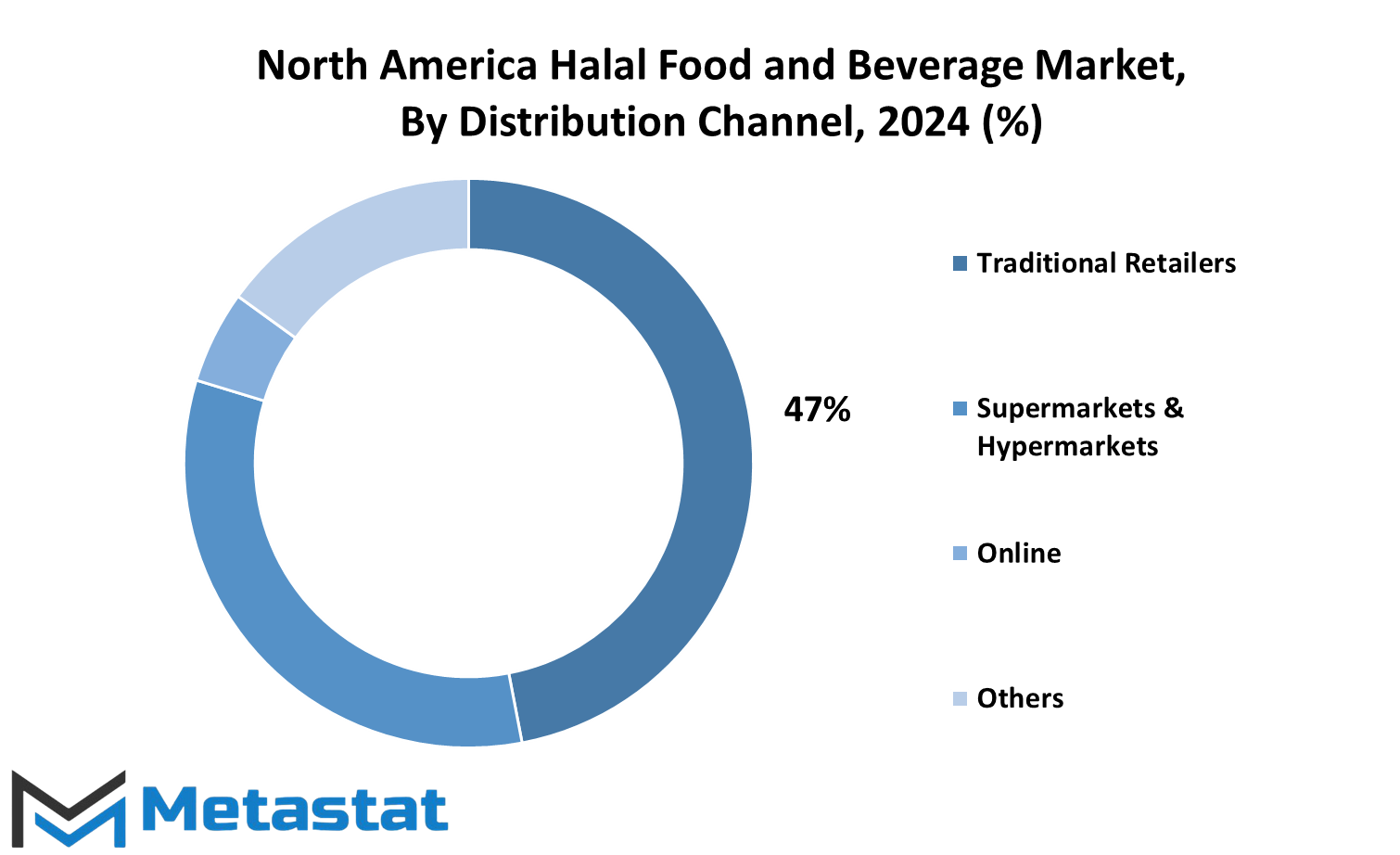
REGIONAL ANALYSIS
The Halal Food and Beverage market has been gaining a lot of attention in North America and is projected to experience decent growth in the next couple of years. With more awareness among customers about the halal products, more and more people in the region are shifting towards such products, not only because of religious reasons but also perceived quality and high ethics. Today, halal food and beverages are in high demand not only among Muslim consumers but have grown to involve a larger audience who values strict adherence to cleanliness, ethical sourcing, and high-quality ingredients. This trend is expected to continue, with more consumers across North America exploring halal options as part of their dietary choices.
The major contributors to the market in the region include the United States, Canada, and Mexico. Each of the above countries represents different opportunities and challenges to expand the circle of halal products. In the US, a generally growing population of Muslims is combined with a broader trend toward multiculturalism, raising demand for both halal foods and beverages. Major cities with varied populations are hubs for halal products, in which more and more retailers and restaurants are suggesting halal-certified options. This is not confined to food alone, as increased halal accredited drinks show in the beverage industry. This reflects the general trend of greater diversity and inclusivity in consumer preference.
Canada, given its reputation for embracing cultural diversity, also sees growth in its halal market. Its large immigrant population has contributed a great deal to the growth in demand for such halal products. Canadian manufacturers and retailers are responding to this growing demand by increasing the availability of more halal products. The effort is further supported by government programs encouraging multiculturalism and inclusiveness. Halal-certified products are increasingly reaching mainstream supermarkets, making access to such products easier for consumers.
The halal market in Mexico is at a very emerging stage, though it holds high potential. While developments regarding awareness of the halal standard are on an upward trend, proximity to the United States enables it to entertain possibilities of its food and beverage industry widening its view toward becoming a large halal market. With strategic importance accorded to the attainment of halal certification, Mexican producers seek opportunities for its acquisition as an asset to tap the wider North American market, mainly in regions that have a high concentration of Muslim consumers.
The continuous growth of the Halal Food and Beverage market in North America is thus likely to be at the core of influencing the future of the food industry across the continent. Given that demand is generally increasing for halal products due to diverse consumer preference and growing cultural inclusivity, the prospects for this market within North America are relatively bright.
|
Report Coverage |
Details |
|
Forecast Period |
2024-2031 |
|
Market Size in 2024 |
$41994.2 million |
|
Market Size by 2031 |
$84447.5 Million |
|
Growth Rate from 2024 to 2031 |
10.5% |
|
Base Year |
2022 |
|
Regions Covered |
North America |
COMPETITIVE PLAYERS
The North America Halal Food and Beverage market has grown remarkably during the last few years, with speculation to continue doing so. Demand for halal products in North America is not only driven by the Muslim population but also by an increasing interest in ethical and clean eating practices among various consumer groups. This is, therefore, making the key players in the industry expand their offering to this diverse clientele.
It is one of the leading companies in this market but also one of the leading companies in this industry globally: Nestle S.A. Because of its huge resources and experience within the food and beverage industries, Nestle has been in a position to develop and market halal products meeting high standards that are needed by halal certification bodies. It is due to their commitment to quality and innovation that they have managed to stay competitive in this growing market.
Another key player is Saffron Road, which has carved its niche by providing a variety of halal-certified products. The company deals in quality food items, sourced from ethical sources to meet the requirements of halal. Its success could also be argued with strong branding and tapping into the increasing demand for halal foods among non-Muslim consumers who are looking for healthier and more ethical options.
The other notable players of North America Halal Food and Beverage market are American Foods Groups, LLC and Cargill Inc. These companies leveraged their vast experience in the meat processing industry to supply halal certified meat products. Their ability to fulfill the rising demand for halal meats enabled them to further expand in the market. The other important players that would complement the supply of the halal meat products include Cresent Foods, Harris Ranch Beef Company, and Midamar Corporation for a wide variety.
Kerry Group PLC is famous through its Wellmune ingredient, while Maple Lodge Farms deals in offerings under the Zabiha Halal brand. These companies have utilized innovative methods of product development, hence the reason why they maintain an unbeatable position in the market with regards to diversification of halal foods within North America.
With consumers' preferences continuing to grow, the North America Halal Food and Beverage market will likely continue into the foreseeable future, with key participants like Maple Leaf Foods Inc., Al Safa Foods Canada Limited, and One World Foods leading innovation by expanding their lineups of products to meet demand for halal products.
North America Halal Food and Beverage Market Key Segments:
By Product Type
- Halal Meat & Alternatives
- Halal Milk & Milk Products
- Halal Grains, Fruits & Vegetables
- Other
By Distribution Channel
- Traditional Retailers
- Supermarkets & Hypermarkets
- Online
- Others
Key North America Halal Food and Beverage Industry Players
- Nestle S.A.
- Saffron Road
- American Foods Group, LLC
- Cargill Inc.
- Cresent Foods
- Harris Ranch Beef Company
- Midamar Corporation
- Kerry Group PLC (Wellmune)
- Maple Lodge Farms (Zabiha Halal)
- Maple Leaf Foods Inc.
- Al Safa Foods Canada Limited
- One World Foods
WHAT REPORT PROVIDES
- Full in-depth analysis of the parent Industry
- Important changes in market and its dynamics
- Segmentation details of the market
- Former, on-going, and projected market analysis in terms of volume and value
- Assessment of niche industry developments
- Market share analysis
- Key strategies of major players
- Emerging segments and regional growth potential



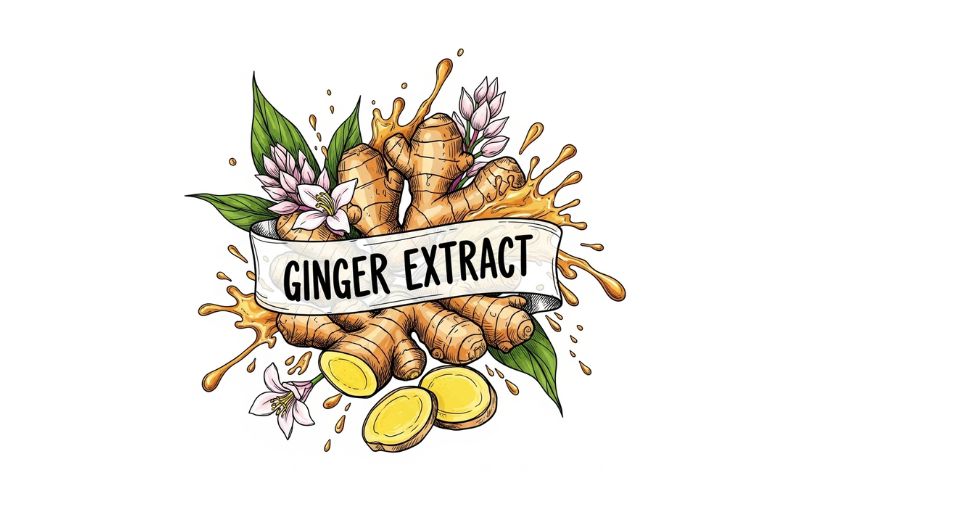

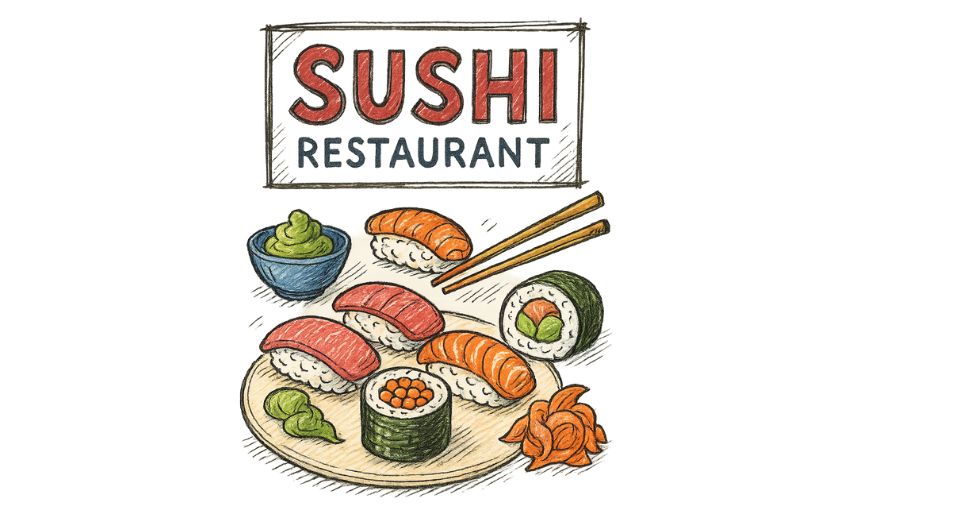
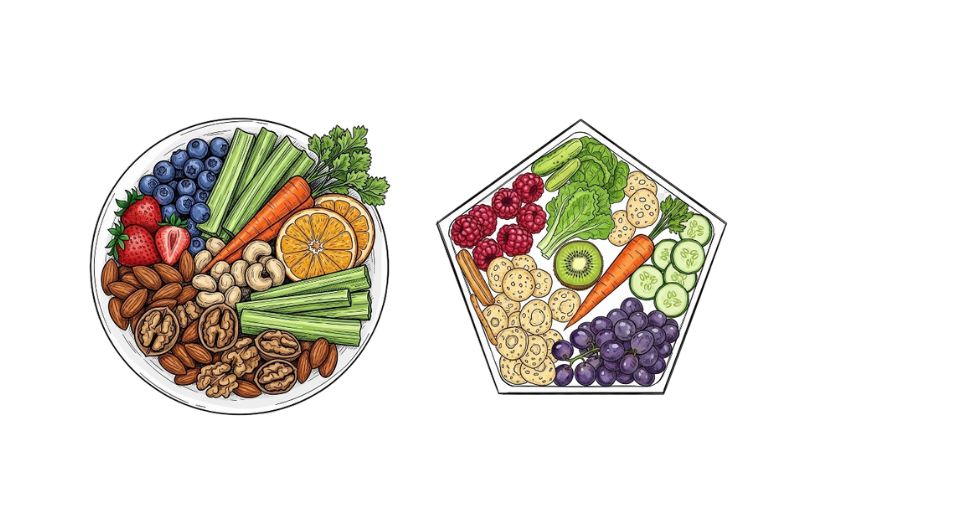

 US: +1 3023308252
US: +1 3023308252






